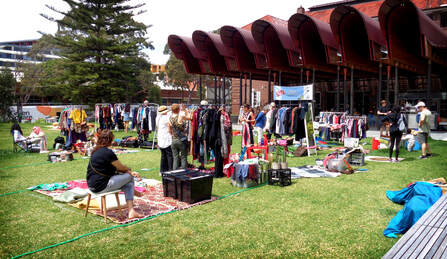council case studies
|
|
|
|
|
More Australians than ever are living in apartment blocks or multi-unit dwellings (MUDs). A 2020 report from the Strata Community Association revealed that 9% of the population live in an apartment, unit or flat, with that number forecasted to grow over the coming years. Engaging this segment of the community in waste avoidance and resource recovery services is a tricky business so it should come as no surprise that the Garage Sale Trail program is increasingly being used by councils across Australia to engage MUD dwellers in reuse and waste avoidance.  WHY MUDS? Sustainability Victoria's guide to resource recovery and recycling at multi-unit dwellings explains that while resource recovery services to single-dwelling domestic households can divert more than 50% of waste from landfill, the current recovery levels from MUDs is often significantly less than this. Low participation in resource recovery is largely attributed to a lack of convenience. Research from other states and territories backs this up. Multi-unit dwellings also often report higher incidents of illegal dumping. It costs Melbourne councils more than $11 million each year to manage instances of illegal dumping [MWRRG]. HOW DOES GARAGE SALE TRAIL ADDRESS THIS? In 2023, around 5% of people who participated in Garage Sale Trail lived in a unit block or apartment. These residents hosted events in common areas of their building or joined local group sales organised by schools or community groups. For these residents, Garage Sale Trail:
In summary, Garage Sale Trail addresses two of the key barriers those living in units face when it comes to resource recovery - a lack of convenience and a sense of anonymity. CASE STUDIES Here are two case studies of councils that have successfully used the program to reduce illegal dumping, increase resource recovery and connect the community around their MUD populations. WILLOUGHBY COUNCIL NSW The City of Willoughby is a high density area, located on the North Shore of Sydney. With a significant proportion of residents living in MUDs, council organised a suitcase sale at a local community centre providing a venue for those living in surrounding unit blocks to sell their pre-loved stuff from. To reach the right people, the council marketing team listed the suitcase sale on the Garage Sale Trail website, advertised on Facebook, flyered the local unit blocks and promoted the sale in their regular e-newsletter to residents. CITY OF SYDNEY NSW In the City of Sydney, a local community group was recruited to run a picnic blanket sale at a local park. Hosted in Green Square and surrounded by new developments, the event included a sausage sizzle and local makers market as well as more than 30 stalls selling pre-loved stuff. Working with a local community group minimised the workload for council and provided an opportunity for the community group to fundraise and recruit new members. Council simply provided permits and promoted the event in their existing channels. Partnerships with local property managers enabled the event to be promoted extensively to those living in the apartment buildings via door drops, posters in common areas and through strata e-newsletters and Facebook groups. More than 400 people attended the event, with an estimated 10,000 kilograms of stuff being sold. Pop up textile recycling banks, provided by The Smith Family, further increased the reuse of items from the event. FIND OUT MORE For more information on how your council can use the Garage Sale Trail program to engage with the MUD community, get in touch to book in a consultation with us. Comments are closed.
|
|
Australia’s leading waste education program inspiring everyday Australians to transition to the circular economy.
Contact
85 William Street, Darlinghurst NSW 2010 councilmanager@garagesaletrail.com.au PH: 0290 643 847 |
|
This project is a NSW EPA Waste Less Recycle More initiative funded from the waste levy.
|
